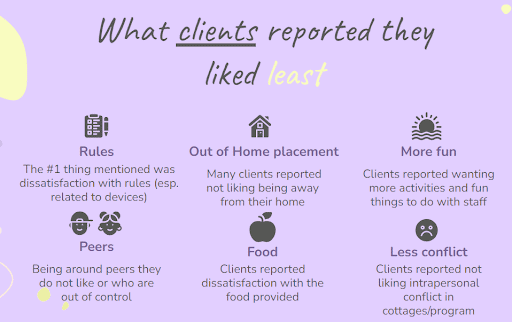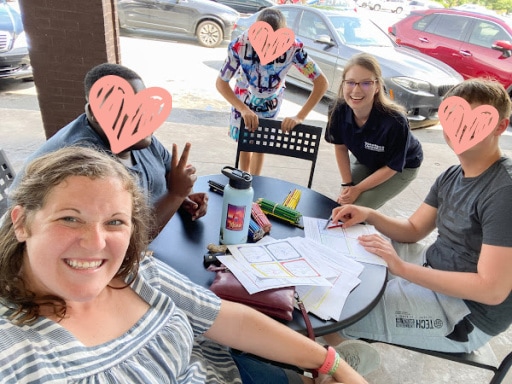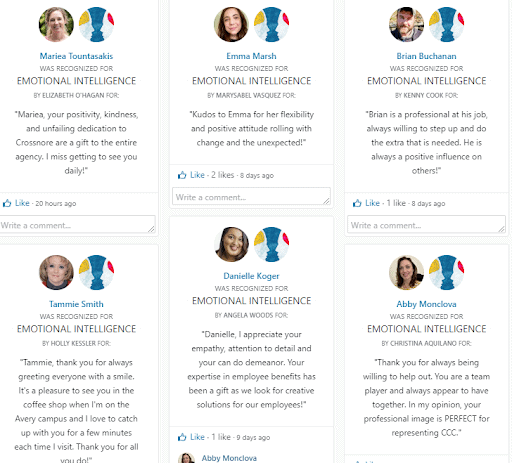By Meredith Martin, MDiv, MSW, LCSW – Senior Director of Program Excellence
Like many other child welfare and mental health agencies, Crossnore is committed to building a data-driven culture to fulfill its mission. To grow healthy futures for children and families by providing a Christian sanctuary of hope and healing.
There was a time when nonprofits were trusted to “do good work” and little proof was required from funders, oversight entities or, most importantly, the clients themselves. Many agencies, like Crossnore, were doing great work during those times. But, the field is changing and tangible proof of our outcomes are important and oftentimes required.
Welcoming Data Accountability
At Crossnore we welcome this change in the human services industry. We value our clients and want to make sure our programs and services are impactful to them. We want to make sure we are helping them meet their goals and achieve healing. Crossnore has a performance and quality improvement plan that guides our work. We use data to measure performance as it relates to the organization’s strategic plan.
We use data in three primary ways across our three divisions (programs, operations and external relations):
- To measure the impact of services on clients
- To measure the quality of our service delivery
- To measure our operational/management performance
Impact of Services on Clients: Permanence
On way is by measuring the impact of our services on clients is through tracking data related to permanency. Permanence is defined by the NC Child Welfare Manual as a child having “a lasting, nurturing, legally secure relationship with at least one adult that is characterized by mutual commitment.”
Our goal is that all our clients living in a placement have permanence as quickly and safely as possible. The goals for permanence in NC are:
- Reunification: 12 months
- Guardianship/Custody: 18 months
- Adoption 24 months
The courts and DSS agencies manage a great deal of this process. But by tracking data related to our client’s length in foster care, we are able to determine how we are helping our clients achieve permanence. By tracking permanency plans for our clients, we are able to use our continuum of services to better meet the needs of the children and families we serve. For example, if a child’s plan changes from reunification to adoption, we are able to quickly evaluate if we have an appropriate licensed foster-to-adopt family who can provide permanence for that child.

To Measure the Quality of Service Delivery: Client and Caregiver Surveys
Crossnore is committed to providing services that are high quality. Just offering a place to live does not mean that a child has found a safe and permanent home. We gather information from our clients and their caregivers directly through annual surveys. The data gathered from these surveys help us to learn more about our clients’ feedback about the programs. After we receive this feedback we celebrate what we are doing well. And we make tangible plans to follow up on the areas where we need to improve.
Our most recent survey of clients and caregivers voiced the following:


After gathering this data through the survey, Crossnore leadership shared this information with staff and stakeholders via email and in person meetings. Leadership also set several goals to learn more about and/or improve areas of concern. For example, Crossnore was able to add a new position, Spiritual Life and Recreation Coordinator, to our Winston campus-based foster care team. The addition of this position has really increased the fun on campus!

Operational/management performance: Staff turnover and retention rates
Like many organizations across the state and nation, Crossnore has experienced a great deal of staff turnover and challenges related to retention in recent years. Paying attention to turnover and retention rates helps us offer the best services we can to our clients. When our staff are stable and reliable, our clients feel safer and are more easily able to engage in the healing process.
Recently our organization adopted a new human resources information system (HRIS) and learning management system (LMS) called Paycor. This system allows the agency to better track how staff are receiving one-on-one supervision and how staff are accessing and completing professional development opportunities. This system also allows us to “shout out” one another for excellence in various areas. The data our HR and leadership teams can gather through the use of Paycor has enabled us to ensure all staff have what they need while at Crossnore. It has also allowed us to feature and celebrate staff for a job well done.

Crossnore will continue to be committed to building and refining our data-driven culture. Each one of our employees and stakeholders contributes to building our database. We look forward to continuing to use this information effectively as we fulfill our strategic plan to strengthen and expand our ability to serve North Carolina’s most vulnerable children with an array of research-based services in a financially sustainable way.
For more information about how we use data at Crossnore see our most recent PQI report.



